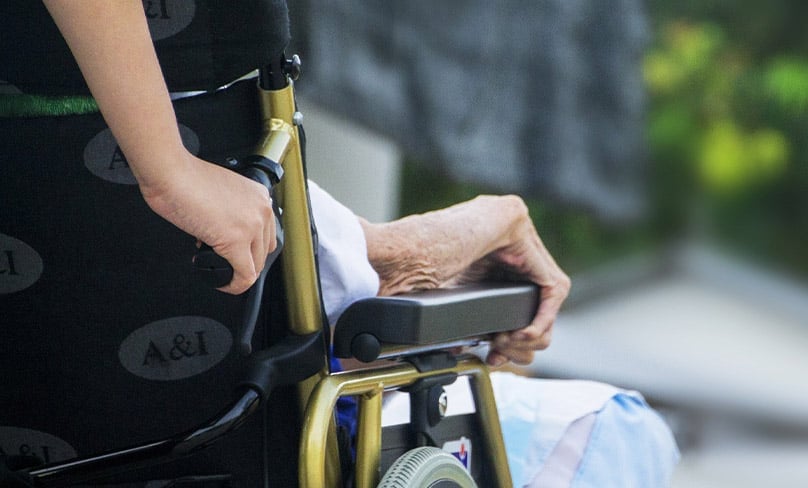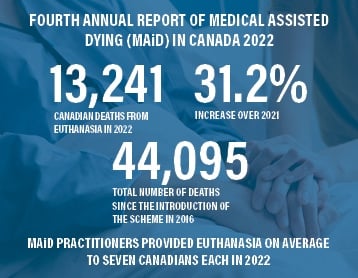
Horrifying new statistics from Canada’s euthanasia regime have prompted further warnings from pro-life groups, with NSW’s own voluntary assisted dying (VAD) own scheme less than a month from commencement.
The fourth annual report of Medical Assistance in Dying (MAiD) in Canada 2022 reported 13,241 deaths from euthanasia, accounting for 4.1 per cent of all deaths in the country.
The number represents a 31.2 per cent increase over 2021, and brings the total number of deaths by euthanasia to 44,095 since the introduction of the scheme in 2016.
The total number of healthcare practitioners providing MAiD increased by nearly 20 per cent in a year, with each having provided euthanasia to seven Canadians on 2022 on average.
Cancer remains the primary illness suffered by those requesting euthanasia in Canada, but 86.3 per cent of cases cited “the loss of ability to engage in meaningful activities” as the reason for their request.
Canada is currently considering expanding the scheme to include mental illness after a temporary moratorium ends in March 2024.
The NSW euthanasia scheme will come into effect on 28 November, and the NT and ACT are preparing their own bills after enabling legislation was passed by Canberra in December 2022.
Right to Life Australia CEO Mary Collier says scope creep “bit by bit” will be a reality in Australia, citing calls to expand existing euthanasia schemes through telehealth.
“The other factor is that there are so many societal problems now where people are felling lonely, are feeling like a burden—all of these things are contributing,” Mrs Collier said.
“This encourages people to feel as if, ‘Well I’m a burden on the health system.’ Or, ‘I’m a burden on my family.’ Or, ‘My family really need some money now.’
“There are so many more other influences that can push for expansion.”
Right to Life Australia’s National Conference in Melbourne on 11 November will host several medical and academic professionals speaking on pro-life topics.
Associate Professor Dr Marion Harris will address the similarities between the Australian and Canadian contexts.

Dr Harris works as a medical oncologist in the public health system in Victoria, which legalised euthanasia one year after Canada.
Because Victoria was the first Australian jurisdiction to make euthanasia legal, and was “quite rigid and narrowly won” the state is “under pressure to amend its laws” from more permissive schemes proposed in other jurisdictions, like the ACT, which is seeking to allow euthanasia without life expectancy criteria.
“It is a worry because once you introduce something, we talk about the slippery slope, and something is not slippery if you think it is good,” Dr Harris said.
“Once you start off with the terminally ill, then you go to people with any life expectancy, then you go to those with mental illness, then you go to minors.
“Then you bring in advance care directives for dementia [healthcare plans for dementia patients who no longer have the capacity to make legally-binding decisions].”
“I do feel this whole issue has been unfavourable for the medical profession,” she added.
“It means doctors have entered into an area in which they were not supposed to become agents of deliberately ending peoples lives.
“Other people will disagree with me, and they think as doctors they are relieving suffering and they are giving the patients what the patient wants. It is a delicate area.”
Less than 1 per cent of Victorian doctors provide euthanasia, Dr Harris said, but nurses were increasingly being used.
She will speak alongside a panel of professionals including Professor Joanna Howe, Professor Margaret Somerville and Catholic Weekly columnist Monica Doumit.
Mrs Collier hopes the national conference will be an opportunity for pro-life Australians to network and feel encouraged, become better informed, as well as find ways to get their message out to politicians on both sides of the debate.
“When euthanasia has gone through some of the states, it has gone through in possibly sweeping numbers,” Mrs Collier said.
“So it is very hard for politicians who are pro-life and want to defend the sanctity of life. We need to encourage them, as well.”
